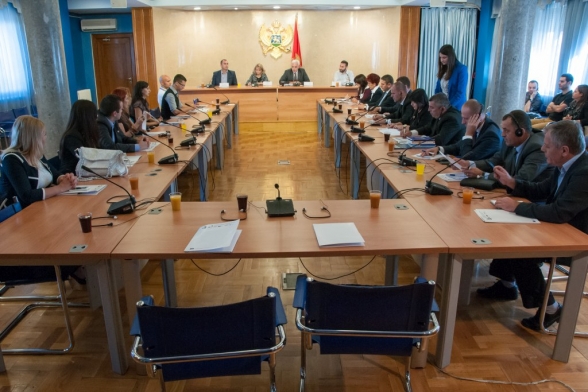The project is implemented by the "Youth Initiative for Human Rights" of Montenegro, in cooperation with the Youth Initiative for Human Rights of Serbia, the Albanian Rehabilitation Centre for Trauma and Torture Victims, and the International Rehabilitation Council for Torture Victims in Denmark.
Chairperson of the Committee informed representatives of the said institutions from the Republic of Serbia and Republic of Albania on work and activities of the Committee on Human Rights and Freedoms in the field of protecting the rights of persons deprived of their liberty, emphasising that a significant progress has been made regarding the respect of human rights and freedoms, preventing discrimination and torture, as well as educating and informing the public. He stressed the importance of introducing the National Mechanism for Torture Prevention, whose report the Committee would consider at one of the following meetings in the Department for Execution of Criminal Sanctions, with the aim of simultaneously contributing to education of prison employees. He also pointed out good cooperation with other institutions, particularly with the Protector of Human Rights and Freedoms and civil sector, which contributes to transparency and openness of the work. When it comes to problems that the Committee has been facing with, he mentioned, inter alia, the issue of great number of returnees which should be addressed by all relevant subjects of the society in the period to come, in order to deal with causes effectively.
Mr Milan Radović, coordinator of the Human Rights Programme in the “Civic Alliance” pointed out professionalism and cohesion in the work of the Committee on Human Rights and Freedoms of the Parliament of Montenegro, which – by its activities - gave a huge contribution to monitoring as well as to significant progress in the field of human rights and creation of society without torture.
The following took part in the discussion: Ms Erinda Bllaca, representative of the Albanian Rehabilitation Centre for Trauma and Torture Victims, Mr Aleksandar Sekulić, law advisor of the Project, and Mr Velimir Vidić and Pal Marku, representatives of prison units from Serbia and Albania.
During the discussion, all participants agreed that it was necessary to improve accommodation facilities and introduce alternative sanctions, as key measures for improving the situation in this field. They agreed that meetings like this one as well as sharing of experience and cooperating are of huge importance for acquiring higher-quality standards in the field of human rights and freedoms in regional countries.









